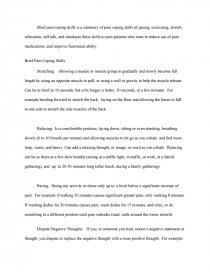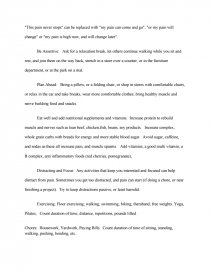Brief Pain Coping Skills
Essay by people • July 11, 2011 • Essay • 578 Words (3 Pages) • 1,771 Views
Brief pain coping skills is a summary of pain coping skills of pacing, exercising, stretch, relaxation, self talk, and intoduces these skills to pain patients who want to reduce use of pain medications, and improve functional ability.
Brief Pain Coping Skills
Stretching: Allowing a muscle or muscle group to gradually and slowly become full length by using an opposite muscle to pull, or using a wall or gravity to help the muscle release. Can be as brief as 10 seconds, but a bit longer is better, 30 seconds, or a few minutes. For example bending forward to stretch the back, laying on the floor and allowing the knees to fall to one side to stretch the side muscles of the back.
Relaxing: In a comfortable position, laying down, sitting or even standing, breathing slowly (6 to 10 breaths per minute) and allowing muscles to let go as you exhale and feel more limp, warm, and heavy. Can add a relaxing thought, or image, or word as you exhale. Relaxing can be as short as a few slow breaths (sitting at a traffic light, in traffic, at work, at a family gathering), and up to 20-30 minutes long (after lunch, during a family gathering).
Pacing: Doing any activity or chore only up to a level below a significant increase of pain. For example if walking 10 minutes causes significant greater pain, only walking 8 minutes. If washing dishes for 20 minutes causes pain, wash dishes for 15 minutes, and relax, or do something in a different position until pain subsides (read, walk around the room, stretch).
Dispute Negative Thoughts: If you, or someone you trust, notice a negative statement or thought, you dispute or replace the negative thought with a more positive thought. For example: "This pain never stops" can be replaced with "my pain can come and go", "or my pain will change" or "my pain is high now, and will change later".
Be Assertive: Ask for a relaxation break, let others continue walking while you sit and rest, and join them on the way back, stretch in a store over a counter, or in the furniture department, or at the park on a mat.
Plan Ahead: Bring a pillow, or a folding chair, or shop in stores with comfortable chairs, or relax in the car and take breaks, wear more comfortable clothes; bring healthy muscle and nerve building food and snacks.
Eat well and add nutritional supplements and vitamins. Increase protein to rebuild muscle and nerves such as lean beef, chicken,fish, beans, soy products. Increase complex, whole grain carbs with breads for energy and more stable blood sugar. Avoid sugar, caffeine, and sodas as these all increase pain, and muscle spasms. Add vitamins, a good multi vitamin, a B complex, anti inflammatory foods (red cherries, pomegranate),
Distracting and Focus: Any activities
...
...

